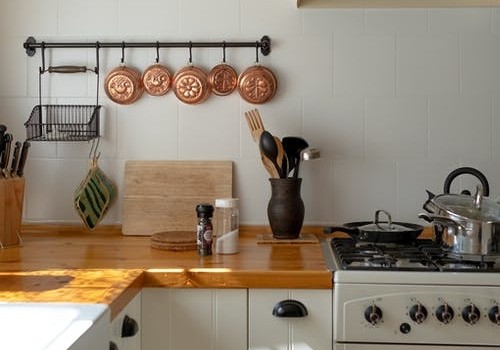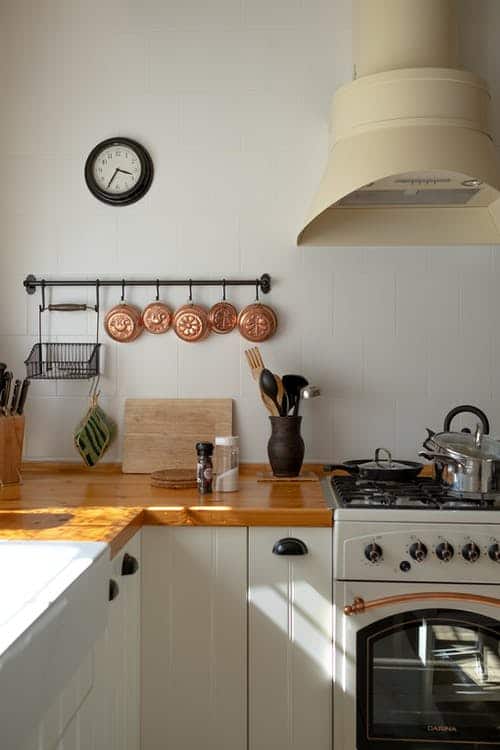
From water pipes to information transmission, copper is a metal we use every day. Copper makes many of modern life’s conveniences possible, but is it the right material for your countertops?
Copper’s brilliant glow when new and its rich, history-filled patina that develops over the years, its simplicity to clean, and its durability are advantages of this metal as a choice for countertops. The disadvantages of copper are that it will change in unpredictable ways, is a finite resource, is not DIY friendly, might have negative environmental impacts, and is more expensive than other countertop materials.
Copper is an intriguing option for kitchen countertops and is worth considering. This article will explain more about copper so you can decide if it is the right choice for the countertops in your home.
Advantages of Copper Countertops:
Copper is a beautiful metal that has been used for millennia by humans for multiple purposes. Copper brings with it certain advantages as a material for countertops, including:
Unique Appearance

Copper is a show-stopping material for countertops. Copper countertops will be the centerpiece of your kitchen and they pair well with other copper furnishings like light covers, range hoods, backsplashes, and sculptures. There are several copper finishes you can choose from to match your taste or design theme.
It is helpful to think of the color of pennies, which contain some copper, to imagine the possible colors of copper countertops. Red, pink, green, black, and brown are colors copper countertops can come in or develop over time.
Polished copper has a shiny, pink appearance, like a brand new penny that comes in the mail. It has a precious metal or jewelry quality that other copper finishes don’t have. It will take maintenance to keep polished copper looking bright because it naturally and quickly reacts with oxygen and takes on a dull appearance.
Unsealed copper countertops develop unpredictable patterns and colors. This is called the patina and gives your countertops the character that some people find desirable. Darker-colored patches can appear during the aging process, sometimes with green spots.
Aged or thick gauge copper has a rich, red/brown color. Aged copper is more subtle and seems leathery and warm. You can choose pre-patinated copper countertops that will not have so many drastic changes over time.
A polished copper countertop fits better in a modern kitchen, with its brighter and cleaner appearance. For a rustic or traditional kitchen, aged and patinated copper countertops can match better with their warm and cozy feeling.
Easy to Clean
Cleaning the kitchen can take some of the joy out of cooking. You can make your cleaning duties easier with copper countertops.
Copper is antimicrobial: it has been proven that it kills bacteria and viruses. With copper countertops, you don’t have to worry about disinfecting the countertop surface often because germs can’t live there for long.
Soapy water and a soft cloth are all you need to clean copper countertops. This will get any stuck-on substances off, then the germ-resistant properties of copper will keep the countertop clean.
Other countertops may need different products to get them clean. With copper countertops, you can simplify your cleaning supply drawer and spend less money on cleaning products.
Some acidic cleaning products can interact with copper and change its color. Vinegar, bleach, and ammonia may all have reactions with copper countertops and you should avoid or use care with these products. Keep your cleaning routine simple and your copper countertops will be better for it.
Long-Lasting and Recyclable
With proper care, copper countertops will be as strong as the day you install them for longer than you will be alive. The patina they develop is not like rust on steel: copper does not degrade or become weaker from exposure to water or air.
A copper countertop may get dented or scratched over time, but this doesn’t affect the way you use it. Signs of age and use are actually sought after as signs that the countertops have a unique history.
If you ever decide to get rid of your copper countertops, they can be recycled and used again. You would most likely find someone who would buy the countertops whole to install them in another home. Otherwise, the copper can be scrapped and turned into other items.
Because copper is a scarce resource, the price of the metal tends to go up over decades. You could sell your copper for a profit if the price rises from when you bought it. You can think of your copper countertops as an investment, and it could pay off if the price of copper goes up enough.

Disadvantages of Copper Countertops:
Copper is a beautiful material, and that is the best reason to choose it for your countertops. That incredible beauty comes with some drawbacks, such as:
High Cost
Ranging in price from $100 to $200 per square foot, including installation, copper is one of the most expensive materials you can choose for countertops. The average kitchen countertop is 30 square feet, so an average countertop made of copper would cost between $3,000 and $6,000.
Marble, another high-end countertop option, can cost from $65 to $95 per square foot installed. Laminate, one of the most economical options for countertops, costs between $40 to $80 per square foot.
Copper is in high demand because it is used in every electronic device to transmit electricity and information. You compete with many other interests to buy copper for countertops, which makes the price high.
Easily Damaged
Copper is a soft metal. It measures 3 on Mohs hardness scales, where 1 is the softest and 10 is the hardest. Steel, which kitchen knives are made of, measures 6.5 on the Mohs scale.
The softness of copper means that kitchen knives will scratch or cut through copper if enough force is applied. Even dropping plates or other kitchenwares on copper countertops can dent the countertops. On a patinated copper countertop, scratches will appear shiny pink and could be a challenge to remove.
Some other countertop materials are harder than copper. Granite scores 8-9 on the Mohs scale, while quartz comes in at 6-7 Mohs. Marble is the same hardness as copper, scoring 3-4 on the Mohs hardness scale.
Being careful around copper countertops is part of owning them. Using cutting boards and staying mindful around the countertops are keys to maintaining copper countertops. If you can’t handle being careful around your countertops, other materials might be a better option.
Unpredictable Changes In Appearance
Copper is a living surface, so its appearance changes as it ages. With routine maintenance, you can keep your copper countertops from changing, but this might be too much work for some people to enjoy.
Copper countertops can start to look dirty. If you enjoy a clean kitchen, copper countertops that take on a dirty appearance could make you feel uncomfortable and like you need to constantly clean.
To enjoy copper countertops, you have to live with the fact that they can go through stages of development that you might find ugly. Copper countertops may not be compatible with people who need to have complete control over the appearance of their kitchen.
Copper Countertops Are Not DIY
Installing copper countertops is a delicate project that could be ruined by a small mistake. It is better to leave this project to a professional who has experience installing copper countertops.
The labor to install copper countertops adds even more to their total price. Attempting to install copper countertops yourself can lead to tearing and bubbles in the copper sheet, which won’t look good.
Copper is easier to install than stone countertops because it is lighter and can be cut with regular tools. But the chances of making a mistake and ruining the expensive copper is too great for us to advise anyone to attempt a copper countertop installation if they don’t have professional experience.
Wooden countertops or laminate could be the best DIY countertops, as they are relatively cheaper and easier to work with. It is better to look for another material besides copper for your countertops if you want to save money or have a fun project.
Copper Is Not A Renewable Resource
If being environmentally friendly and sustainable is important to you, copper is not a good choice. Copper is a key component to many necessary items, while a kitchen countertop is a luxury item that you could choose to make from sustainable materials.
While you can buy recycled copper, that recycled copper could be used to make medical equipment, airplanes, and various other electronic devices. Buying a copper countertop raises the demand for copper, which makes the price of other necessary items go up.
Copper mining has an impact on the environment and you might want to consider this when choosing your countertops. The main method of copper mining is open-pit mining, which disturbs large areas of the earth, in ways that they may never be able to recover from.
Not to make you feel like you are ruining the planet if you choose copper countertops, you are not. It is important to be aware of the impacts of the materials we choose to use and make a decision weighing all the information.

